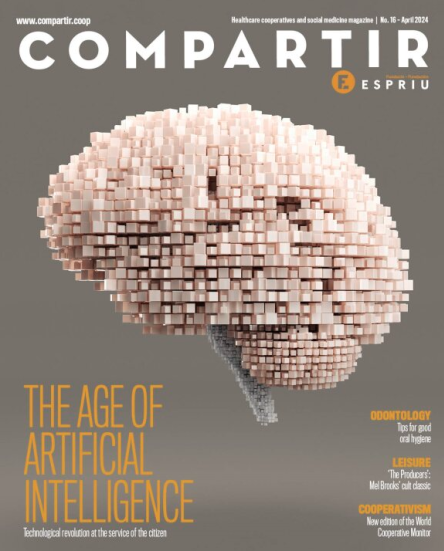
Concepción Giner. Medical director of the Hospital HLA Vistahermosa. Specialized in microbiology. Director of analysis laboratory at HLA Vistahermosa from 2005 to 2010.
“In my first meeting I felt very lonely, but thirteen years later there are more women in the room”
Dr. Giner studied at the University of Alicante and specialized in infectious diseases and clinical microbiology. She finished at a time when there were quite a few unemployed doctors and, by a “lift coincidence”, ended up creating the clinical microbiology laboratory at HLA Vistahermosa, in her hometown, Alicante. After assuming the position of general manager of analysis and clinical microbiology, they offered her the position of medical director of the hospital, thirteen years ago. During this time, she says, she has experienced the feminisation of hospitals as a natural evolution of the sector.
Is health care from a female perspective the same as from a male perspective?
For more than twenty years we have been working with the concept of differential morbidity, which is nothing more than the difference in pathologies, treatments and prognoses depending on gender. Cancer affects one in two men and one in three women; there is a gender prevalence. But chemotherapy has more side effects in the female sex. So, there is a gender-dependent development of health care activity and the knowledge about these differences by the staff makes health care more efficient. If we talk about the patient’s perception, it has been demonstrated that the female gender is recognised for its empathy, its tendency to care work or its great capacity for management and negotiation in groups. I believe that these are characteristics that we have as women, and that as doctors we apply them. But from a scientific point of view I would say that regardless of the fact that care, which is something more subjective, may be better for a particular gender, medical action is something objective and should only respond to the diagnosis.
But there has been a long-standing role association in which the doctor was a male figure.
This was a long time ago, but yes. I have seen the typical patient hospitalised at an advanced age, twenty years ago, who, when he saw you were coming in at the age of twenty-seven, fresh out of university, he would ask for the doctor to come and see him. Sometimes I even had a slightly more intoned encounter. But I would be lying to you if I told you that I have had great difficulties in this aspect and, if that was the case, they would have a hard time now, because in the hospital more than 60% of the staff are women.
In fact, according to FACME data, 61% of doctors in Spain are women. Why do you think this increase is due to?
There has always been a high percentage of women in the health professions, not only in medical education. It is likely that the gradual increase year after year of this percentage has something to do with a filter for entering into medical schools determined by grades which start counting from the age of 16. Women tend to reach maturity much earlier, and it may focus them on the understanding of their decision and therefore on the beginning to make the effort to reach it. And I also think that women tend to be more tenacious in their commitments, especially at this age.
Medicine is a path that requires efforts and women may now be prioritising their careers or even postponing motherhood...
I would not dare to make such a categorical statement. I have three brothers and at home I never noticed a difference in the choices we made. At home I did not find this problem and in my professional life I have not felt it either, but it is true that I have been in environments where there are women who have had to choose between their career and motherhood, and it has been more difficult for me to meet men who have had to face this problem. I am also a mother and I know that it is complicated to have to choose, but I don’t know if it is a question of gender or how motherhood is experienced. It used to be lived differently and now there are many men who understand fatherhood as something more than just having children.
However, women continue to ask for a reduction in their working hours in order to balance work and family life.
I also have the feeling that it is not socially understood that women decide to have children in the same way that men do, for example by leaving them with caregivers, if they have the opportunity. It is quite another thing if you decide, on a personal basis, to devote yourself completely to your children. Then, even if you don’t want to, you are paralysed professionally, at least for a few years. And, obviously, if there is no family or financial support, the complexity of this decision is greater.
How has the management of your position changed over the years?
I have been in the medical management profession for thirteen years and I would never have imagined what has happened in all this time. Digital medical records, the changes between public and private healthcare, the extremely important current technological revolution, the evolution in medication, genetics, the world pandemic... When Dr. Ivorra gave me the job I could never have imagined a future like this, but my motto has always been the same: knowledge, maximum implication and teamwork. And in the case of feminisation, it is not done on purpose, but in my hospital most of the people responsible of the specialised units are women, and it is not because it has been intended to be so.
Almost thirty years ago you were a young woman in a position of great responsibility. How do you see the access of young women to positions with a significant influence in today’s hospital structures?
Although Spanish healthcare is considered as one of the most feminised in Europe, data still confirm that men are three times more numerous than women in positions of responsibility and management. In the past, you would go to any hospital and the manager or director was a man of an older age. When I arrived I was so anxious to do well that I felt it more like a call for help than a victory. At the first meeting I remember feeling very lonely, but thirteen years later there are more women and more young women in the room. And I think the future looks very positive for us.
What do you think you can do in terms of women’s representation in this sector in the meantime?
Being the medical director of HLA Vistahermosa puts me in a position of representation, as well as responsibility. I like going to interviews and events and being linked to my city, Alicante. I feel that the fact that I go, as a woman, is a certain way for people to normalise the presence of women in positions of responsibility. If in the past it was always men, I feel honoured to be able to assume this position of representation now, as a demonstration that things are changing. And, more than as a woman, as a person, I also look for the best teams, without being conditioned by gender.



